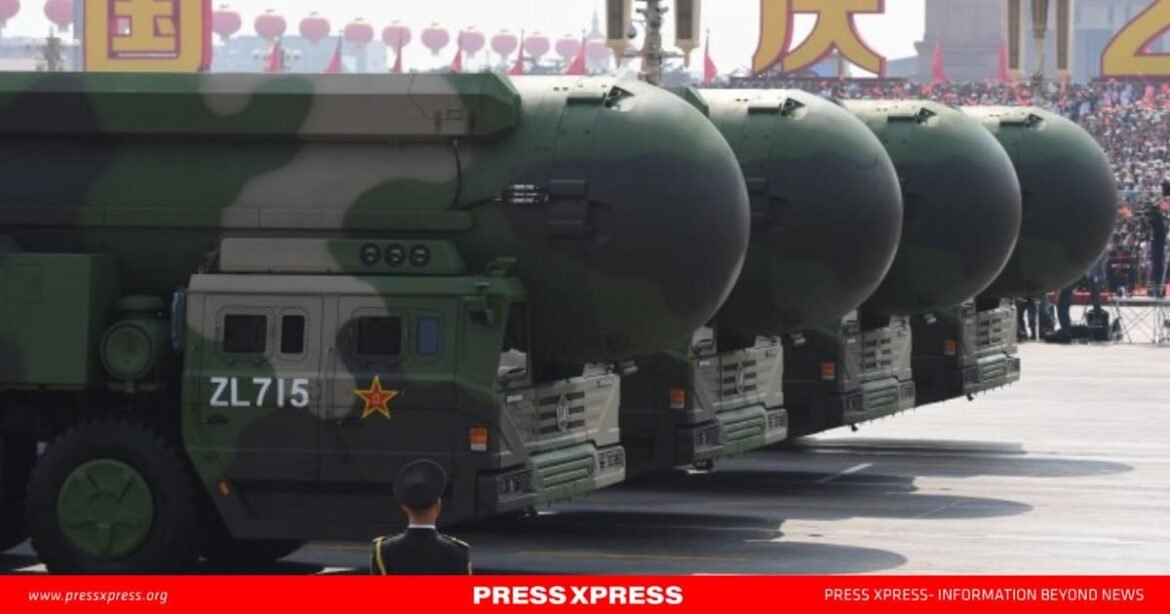A major war game conducted by the Center for Strategic and International Studies (CSIS) and MIT’s war gaming lab has found that expanding the United States’ nuclear arsenal would not significantly deter China from using nuclear weapons in a hypothetical conflict over Taiwan. The findings challenge growing calls in Washington for additional nuclear capabilities amid heightened tensions with Beijing.
China’s Growing Nuclear Capabilities
For decades, China maintained a relatively small nuclear arsenal with a focus on deterrence and retaliation. However, the Pentagon estimates that Beijing’s stockpile of operational warheads—over 500 as of 2024—could double by 2030. This modernization includes developing a nuclear triad, allowing China to launch weapons from land-based missiles, submarines, and bombers.

The U.S. has responded with discussions of enhancing its own nuclear capabilities, including potentially redeploying tactical nuclear weapons such as submarine-launched cruise missiles (SLCM-N), a system retired after the Cold War. Advocates argue that bolstering the U.S. arsenal could address gaps in conventional capabilities and strengthen deterrence.
The war game, however, indicated otherwise. Eric Heginbotham, an MIT expert involved in the study, stated, “In no cases did participants feel the need for nuclear systems outside those already in the U.S. modernization plan.” This suggests that existing U.S. capabilities, which include over 600 tactical nuclear weapons, are sufficient for deterrence in a Taiwan scenario.
Escalation Risks in a Taiwan Conflict
The war game simulated a potential conflict over Taiwan in 2028, examining when and why either side might use nuclear weapons. The exercise revealed that nuclear escalation often stemmed from battlefield dynamics rather than the size of either nation’s arsenal. Teams playing China were most likely to consider nuclear use when their invasion of Taiwan was on the brink of failure.
While previous CSIS simulations of a conventional Taiwan conflict suggested a decisive U.S. victory, this nuclear-enabled exercise painted a more uncertain picture. Out of 15 iterations, only five ended with a Chinese withdrawal, and four of those occurred without nuclear weapons being used. The remaining scenarios resulted in prolonged conflict, inconclusive outcomes, or catastrophic nuclear escalation.
In three iterations, limited nuclear strikes led to retaliatory attacks on civilian population centers in both countries, causing millions of casualties. These findings highlight the unpredictability of escalation once nuclear weapons are introduced and underscore the human cost of such a conflict.
The Debate Over Deterrence
The findings come amid an ongoing debate in Washington about the role of nuclear weapons in deterring China. Some policymakers argue that a robust U.S. nuclear arsenal could discourage Beijing from pursuing military action in Taiwan or aligning more closely with Russia. Others warn that a renewed arms race could increase tensions without providing meaningful strategic advantages.
The war game’s authors cautioned against assuming that numerical superiority in nuclear weapons would deter China. “China did not perceive constraints on the U.S. ability to deliver nuclear strikes,” the report concluded, suggesting that Beijing’s decision-making is influenced by broader geopolitical considerations and battlefield conditions rather than the size of the U.S. arsenal.
A Need for Strategic Alternatives
The war game highlighted the importance of diplomatic strategies, particularly the use of “off-ramps” to de-escalate conflicts before they spiral out of control. Historical precedents, such as the Cuban Missile Crisis, demonstrate how concessions can allow adversaries to back down without losing face.
However, Mark Cancian, a senior adviser at CSIS and a co-author of the study, warned that time constraints in a Taiwan conflict might limit such opportunities. “In a nuclear scenario, escalation can occur within hours, leaving little room for negotiation. Planning off-ramps in advance is crucial,” he said.
The authors also recommended that the U.S. collaborate with allies to explore diplomatic solutions that could reduce the likelihood of nuclear escalation, such as clearly defined red lines and conflict resolution mechanisms.
Regional Implications and Broader Risks
China has repeatedly dismissed U.S. concerns about its nuclear build-up, accusing Washington of using the issue as a pretext to expand its own arsenal. “It is the U.S. that is the primary source of nuclear threats and strategic risks,” Chinese foreign ministry spokesperson Mao Ning said earlier this year. Beijing insists its nuclear modernization is defensive and aimed at maintaining second-strike capabilities.
The study also touched on fears of closer Sino-Russian cooperation. Moscow’s nuclear rhetoric during the Ukraine war has heightened concerns that China could adopt a similarly aggressive posture. However, the war game suggested that U.S.-China dynamics in Taiwan are shaped more by regional factors than by external alliances.
Beyond the Arms Race
The CSIS-MIT war game offers a critical perspective on the utility of nuclear weapons in modern conflicts. It challenges the assumption that a larger U.S. arsenal would provide greater security in a Taiwan scenario, emphasizing the importance of strategy, diplomacy, and alliance-building over quantitative nuclear superiority.
As tensions in the Taiwan Strait persist, the findings underscore the need for proactive measures to manage escalation risks and prevent catastrophic outcomes. While nuclear deterrence remains a cornerstone of U.S. defense policy, this study suggests that its role in addressing the complex dynamics of a Taiwan conflict may be more limited than previously assumed.


